Institute for Digital Culture
Activity
Live Audience VR Testing with MBD
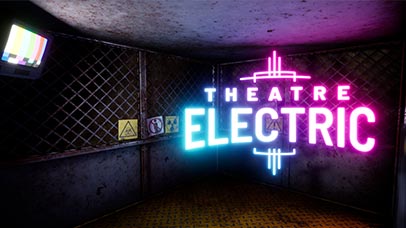
Theatre Electric seamlessly blends technology, storytelling and stunning visuals to offer a unique and interactive VR adventure. Audiences had the opportunity to witness the future of VR first hand, and actively contribute to its refinement and improvement. During these events, audiences played a pivotal role in shaping the development of Theatre Electric, before its world premiere at Frequency Festival in late October.
The invaluable insights and observations of those who attended has played a pivotal role in the transformation of Theatre Electric into a more refined, engaging, and entertaining VR adventure. The success of these events reaffirms the importance of user-centered design and iterative development in the world of VR, and underlines the important role that the Institute for Digital Culture plays in developing and supporting new cultural experiments using cutting edge technology.
The Output (podcast, 2023)
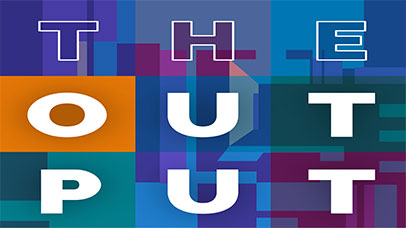 The Output explores our world of digital culture – how we got here, why we got here, what we’re doing here – through providing fresh and diverse perspectives on technology in our lives today. Over four stand-alone episodes, this series profiles and interrogate the central ideas underpinning the new Institute for Digital Culture at the University of Leicester in its inaugural year. Presented by Dr Sophie Frost, Honorary Research Fellow at the Institute, and Chris Thorpe-Tracey, former singer-songwriter now activist, writer and broadcaster, this podcast locates the Institute as a catalyst for new thinking, experiments, and interventions in digital culture. Join Sophie and Chris as they learn about new and emerging perspectives that will have relevance to both academic and non-academic audiences. The Output features voices, both familiar and underheard, from across the academic, cultural, and tech sectors. While those working within new digital scholarship have an important place in this series, it also profiles those working directly within arts and cultural contexts.
The Output explores our world of digital culture – how we got here, why we got here, what we’re doing here – through providing fresh and diverse perspectives on technology in our lives today. Over four stand-alone episodes, this series profiles and interrogate the central ideas underpinning the new Institute for Digital Culture at the University of Leicester in its inaugural year. Presented by Dr Sophie Frost, Honorary Research Fellow at the Institute, and Chris Thorpe-Tracey, former singer-songwriter now activist, writer and broadcaster, this podcast locates the Institute as a catalyst for new thinking, experiments, and interventions in digital culture. Join Sophie and Chris as they learn about new and emerging perspectives that will have relevance to both academic and non-academic audiences. The Output features voices, both familiar and underheard, from across the academic, cultural, and tech sectors. While those working within new digital scholarship have an important place in this series, it also profiles those working directly within arts and cultural contexts.
Knowledge Transfer Partnership with The Audience Agency
The Institute for Digital Culture have successfully partnered with The Audience Agency to collaborate on an exciting new AI project which will be funded through Innovate UK’s knowledge transfer partnership (KTP) scheme. The Audience Agency was established in 2011 and provides organisations in the cultural, arts and heritage sectors with customer intelligence. The main aim of this project is to embed AI functionality within The Audience Agency’s software, enabling clients to optimise their segmentation strategy and facilitate managerial decision making. It is anticipated that by the completion of the project, the Audience Agency will have expanded its customer base internationally, allowing clients to attract diverse communities to cultural, arts and heritage experiences.
This project will build upon the University of Leicester’s long-standing partnership with The Audience Agency where they have developed digital maturity models for the cultural sector. The project team is composed of a cross-disciplinary group of academics and industry professionals with expertise from mathematics, computer science, business and the arts. University of Leicester academics, Dr William Darler (Lecturer in Applied Analytics and Digital Economy) and Professor Andrew Hugill (Deputy Director of the Institute for Digital Culture) will be working with industry experts Patrick Towell (Commercial Innovation Director), and Oliver Mantell (Director of Evidence and Insight) to employ, mentor and train a Knowledge Transfer Associate who will be key to the realisation of the venture. The Audience Agency will gain knowledge and skills to embed machine learning methods within their software and academics from the University of Leicester will have the opportunity to apply their skills to a real-world project, resulting in positive economic and social impacts in the cultural sector.
JISC visit
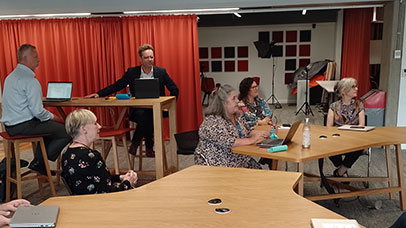 On 15 August 2023, Heidi Fraser-Krauss, the CEO of JISC and colleagues Liam Earney, MD Higher Education and Research and Jason Curtis, Senior Relationship Manager, visited the University of Leicester as the University embarks on its digital journey transformation.
On 15 August 2023, Heidi Fraser-Krauss, the CEO of JISC and colleagues Liam Earney, MD Higher Education and Research and Jason Curtis, Senior Relationship Manager, visited the University of Leicester as the University embarks on its digital journey transformation.
The visit was an opportunity for the University to showcase the University’s work across the institution in digital, and included a roundtable session that Heidi, Liam and Jason participated in with some of our academic leaders in AI which was centred on the potential and challenges that AI pose to the Higher Education sector.
During the visit, JISC associates visited the Institutes Digital Culture Studio where Professor Ross Parry, the director for the Institute for Digital Culture, gave a talk on the Institute and the exciting work it is doing.
Breaking Barriers Digitally: Transforming Cultural and Heritage Experiences
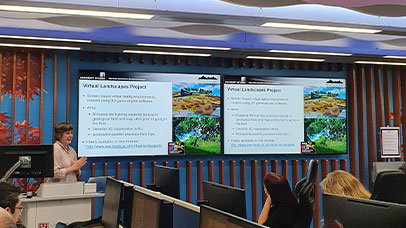 On the 27 July 2023, to conclude their Creative Engagement Fellowship Project in collaboration with the Institute for Digital Culture and the Wellcome Trust, Manlin Zhang, Anna McGairy, Ed Thomas and digital artist Rosa Francesca hosted the Breaking Barriers Digitally: Transforming Cultural and Heritage Experiences symposium at the Institutes Digital Culture Studio. The symposium included a series of talks and workshops with an introduction from Institute director, Professor Ross Parry. Manlin Zhang presented on the Geoscience in Pixels project exploring the experiences of people with invisible illnesses and disabilities doing geoscience-related fieldwork.
On the 27 July 2023, to conclude their Creative Engagement Fellowship Project in collaboration with the Institute for Digital Culture and the Wellcome Trust, Manlin Zhang, Anna McGairy, Ed Thomas and digital artist Rosa Francesca hosted the Breaking Barriers Digitally: Transforming Cultural and Heritage Experiences symposium at the Institutes Digital Culture Studio. The symposium included a series of talks and workshops with an introduction from Institute director, Professor Ross Parry. Manlin Zhang presented on the Geoscience in Pixels project exploring the experiences of people with invisible illnesses and disabilities doing geoscience-related fieldwork.
The day included a talk from Professor Richard Sandell from the University’s Research Centre for Museums and Galleries on the Everywhere and Nowhere project; a hybrid keynote from Heather Smith, who works as a Access and Equality Specialist for the National Trust; a workshop on virtual reality field trips and its advantages and disadvantages by Clare Gordon from the University of Leeds; and a panel discussion featuring Kajal Patel a researcher involved in the green social prescribing project in the department of Psychology and Vision Sciences, Vicki James of The National Forest and Gordon Malcom from Dementia Adventure.
Attendees were able to have discussions around access and inclusion, and many exchanged their details to continue these conversations. We hope that events like this will expand on existing conversations around ableism across many sectors, and it strongly aligns with the Institute for Digital Culture’s core values of inclusivity, innovation, and impact.
Research Observatory EU
During the summer, members of the Institute for Digital Culture gathered to discuss the concept of a modern Research Observatory. The forum, motivated by a range of specific objectives, aimed to create a distinct and recognizable presence for the observatory within the global research community.
Discussions were rigorous, with a focus on how the observatory could differentiate itself in an increasingly crowded field of research entities across North America, Europe, and Australia. Collaboration was also a top priority, but with a specific emphasis: to connect the research theme leads and fellows from the Institute for Digital Culture with relevant activities, research initiatives, and potential partners and funders outside of Leicester. This was not simply about identifying possible partnerships, but also involved developing strategic pathways for nurturing these professional relationships. The observatory was envisioned as a proactive entity, capable of identifying and responding to emerging trends and key drivers within the broader research landscape. As such, substantial time was devoted to conceptualising a resilient system to monitor, analyse, and disseminate insights into future shifts within the field.
During these strategic discussions, attendees also took part in informal 'meet-and-greet' sessions, primarily with organisations based in Austria. These interactions, although less formal, were equally significant, as they laid the groundwork for future collaborations, thereby strengthening the foundation for an increasingly interconnected and innovative research future.
Museum 2050
The Institute of Digital Culture hosted its inaugural immersive residential event, which brought together a select group of leaders and rising stars from various museums across the UK. The event, held in a retreat-like setting away from daily distractions, aimed to explore the concept of "futuring" and plan for the long-term future of the cultural sector, with a specific focus on the years leading up to 2050. Attendees were treated to thought-provoking insights from renowned experts at the University of Leicester, including Dr Ed Hollox, Professor Mark Williams, Professor Emma Bunce, and Professor Jeremy Howick, who acted as catalysts for in-depth discussions and strategic planning.
Throughout the event, participants examined the potential implications of emerging technologies and societal changes on museums and the broader cultural landscape, using digital culture as a lens. A variety of "futuring activities" were employed to help attendees identify key moments and signals of change across three distinct time horizons within the next decade. These exercises were designed to help participants recognize patterns and trends, become attuned to potential shifts in driving forces within the cultural sector, and equip them with the necessary resources, knowledge, and skills to effectively plan for multiple potential futures.
Overall, the event was a crucial step in preparing cultural leaders to navigate the complexities of a rapidly changing world and ensuring that museums remain relevant and adaptive through to 2050 and beyond. It marked the first of many such events to come from the Institute of Digital Culture, which is dedicated to fostering innovation and creativity in the cultural sector.
British Library's Unlocking our Sound Heritage workshop
In July 2023 the Institute for Digital Culture hosted a two day workshop with members of the British Library’s Unlocking Our Sound Heritage (UOSH) network. The UOSH project was part of an £18.8mn UK-wide sound preservation project run by the British Library. The University’s East Midlands Oral History Archive, hosted by the University's Archives & Special Collections, was the Midlands hub for the project. Other hubs were based in local authority archives e.g. London Met, Norfolk, Bristol, Tyne & Wear; national libraries and museums for Wales, Scotland and Northern Ireland; the University of Sussex. Representatives of most of the hubs, along with other interested parties from the University of York, Essex Record Office, and the University of Leicester, attended.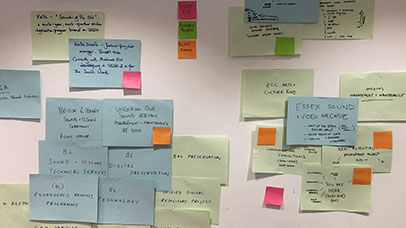
The sustainability of the UOSH network, and the skills and knowledge created by the project, are an important consideration for both the British Library and the hubs. One of the worries for future sound preservation is the lack of working sound playback machines e.g. cassette decks, tape players. The situation will only get worse and it is possible to see a future with barely any working playback devices for many audio formats.
The workshop discussed the current situation, and the future needs, of the hubs. Among other things, it identified the need for a new national audit of sound collections to inform the sourcing of playback equipment, and also discussed the possibility of a loan bank of working, serviced equipment. Overall, the meeting was very positive, and will inform the work of UOSH as it moves forward.
Creative Engagement Fellowship showcase
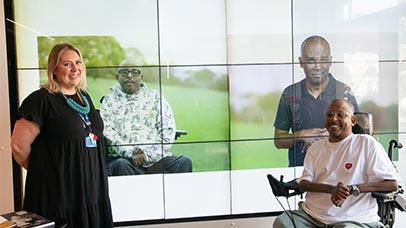 A launch event held at the Institutes Digital Culture Studio on the 14 July 2023 hosted by the Attenborough Arts Centre showcased the outputs of their 5 Creative Engagement Fellowship (CEF) projects. The CEF initiative was successfully piloted in 2020 as part of the University’s grant from the Wellcome Trust Institutional Strategic Support Fund, aiming to further develop public engagement across the University by fostering interdisciplinary collaborations which particularly promote diversity and inclusion.
A launch event held at the Institutes Digital Culture Studio on the 14 July 2023 hosted by the Attenborough Arts Centre showcased the outputs of their 5 Creative Engagement Fellowship (CEF) projects. The CEF initiative was successfully piloted in 2020 as part of the University’s grant from the Wellcome Trust Institutional Strategic Support Fund, aiming to further develop public engagement across the University by fostering interdisciplinary collaborations which particularly promote diversity and inclusion.
Five research projects were chosen, coming from all three Colleges of the University, and Attenborough Arts Centre facilitated introductions to a range of artists who were interviewed by each research team, who then chose the artist they wanted to work with. Each project worked together during the academic year on their research collaborations and each created a digital output that was showcased at the launch event. Find out more about each project.
Visioning a Cultural and Creative County
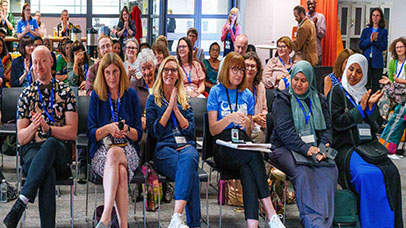 On 11 July 2023 the Institute hosted the Visioning a Creative and Cultural County Summer Project Day at the Digital Culture Studio, in collaboration with the University of Nottingham and Culture Leicestershire. Since January 2023, Dr Sophie Frost, Honorary Research Fellow at the Institute, has been working with Daniel Mutibwa, Associate Professor of Creative Industries and Digital Culture in the Department of Cultural, Media and Visual Studies at University of Nottingham, on a collaborative QR-funded project with Leicestershire County Council to develop a new cultural strategy for the service.
On 11 July 2023 the Institute hosted the Visioning a Creative and Cultural County Summer Project Day at the Digital Culture Studio, in collaboration with the University of Nottingham and Culture Leicestershire. Since January 2023, Dr Sophie Frost, Honorary Research Fellow at the Institute, has been working with Daniel Mutibwa, Associate Professor of Creative Industries and Digital Culture in the Department of Cultural, Media and Visual Studies at University of Nottingham, on a collaborative QR-funded project with Leicestershire County Council to develop a new cultural strategy for the service.
In this day-long event, over seventy volunteers, artists, cultural participation staff, strategic leaders, and academics shared their expertise, ideas, and thoughts. The aim was to continue the development of the new cultural strategy, following Culture Leicestershire’s successful bid to become a National Portfolio Organisation in Arts Council England’s 2023-26 investment round. Arts educator, learning officer and learning curator Jon Sleigh opened the day with a keynote sharing his work as an LGBTQ + practitioner, while Daniel and Sophie shared their findings from the project so far from their local, regional, and national research including focus groups, workshops, and interviews. They were joined by other speakers from the County Council, who reflected on the work and activities of this diverse cultural service. After lunch, the Anand Mangal Ladies group brought flashes of colour and energy to the day, by performing a lively stick traditional dance. Afternoon workshops gave everyone a chance to have their say exploring the unique perspectives of strategists, cultural delivery staff, volunteers, participants, and creative practitioners.
Leicestershire County Council Leicestershire County Council’s Libraries and Heritage Services operates from 21 venues across the county with a remit of libraries, museums, collections, and learning.
AoIR Flashpoint Symposium and Summer School
From the 15-17 June 2023, Institute fellow, Dr. Alberto Cossu attended the AoIR (Association of Internet Researchers) Flashpoint Symposium and Summer School at the University of Naples Federico II. Alberto offers his reflections on the experience: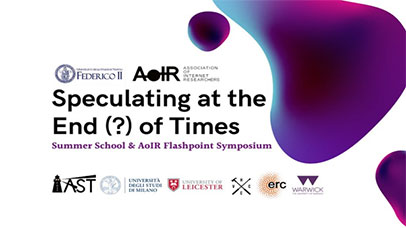
"The general mood in the early 21st Century is that it is easier to imagine the end of the world than to imagine the end of our current socio-economic conditions (or, as the original quote went, ‘the end of Capitalism’). Yet we will have to precisely do that, since things are starting to change very quickly at the level of climate change, technological development as well as political and economic transformations. With these challenges in mind, the Summer School “Speculating at the End (?) of Times” provided some coordinates to imagine new futures. The Summer School allowed a diverse and international cohort of thirty doctoral students to attend a series of keynotes and panels, also offering them the chance to receive extensive feedback on their research projects with the faculty. The program of the Summer School, organised by Prof. Adam Arvidsson and Prof. Micheal Szalay with the support of the University of Leicester, University of Warwick, the ERC Project “Craftwork'' and the AoIR (Association of Internet Researchers).
Speculation is the keyword that animated three days of discussion, and there cannot be a better palimpsest to speculate on alternative futures at ‘the end of times’ than a city that has been living at the end of times for most of modernity.
The digital emerged as a key topic, for different interventions pointed to its role in extending a ‘speculative’ logic to all realms of life, from dating to crypto finance. Yet, one insight was precisely to understand speculation as a capacity to ‘connect’ and not only as a colonising and alienating logic. I left the Summer School reflecting on the need for a renewed capacity to imagine brighter futures be more lenient to our own faults as humanity, and move slowly but confidently out of the apocalyptic thinking."
HP Roundtable
On 13 June 2023, Institute fellow, Dr Alberto Cossu was invited to join a roundtable organised by Hewlett Packard (HP), the main provider of laptops and IT services to the University, at their London headquarters. One of the benefits of the University's partnership with them is that they allowed a selected committee of academics and buyers to have a glimpse of the future of data thanks to the brilliant insights by Chandrakant D. Patel (HP Chief Engineer and Senior Fellow). This meeting granted the committee to pick the brain of one of the most well-informed individuals working at the forefront of technology. Alberto shares a couple of insights that have changed his perspective on data: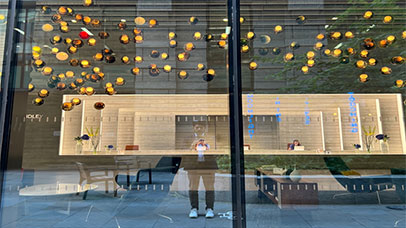
"First, the digital transformation is getting very physical. The need to store an increasing amount of data demands for a massive physical infrastructure which is costly to set-up and run. Chandrakant explained how, increasingly, senior figures in the tech industry are asking questions about what exactly the value is of capturing additional petabytes of data, given that data, to be valuable, should contain usable information for us.
The fact that most data is not meaningful to us relies on the fundamental logic of data production. Data is machine-created, and it is often raw, unstructured data which requires considerable resources to be captured and even more to make sense of.
Radical ideas that could potentially shape the future of data include:
- Only keep the metadata (data that describe the content e.g. keywords) because the rest of the data (audio, video etc.) is too expensive to store.
- Translate heavy data types, as video, into text. This could possibly open a frontier for which AI could then create videos from those scripted prompts (with varying results).
These proposals should be discussed having in mind other cultural imperatives, such as the need for archiving cultural production. How will we decide what we should keep intact, and what should we keep in a lighter metadata format? Possibly this is a conversation to develop in future events at the Institute for Digital Culture. Stay tuned!"
Research in Action workshop
The Research in Action (RiA) workshop convened on 5 July 2023 at the Monash University Prato Centre in Prato, Italy. RiA, which was “dedicated to practice-based research into, for and through digital culture”, was facilitated by Ross Parry (University of Leicester), Jon McCormack (Monash University), and Vince Dziekan (Monash University). This workshop, hosted by SensiLab from Monash University, explored the connections between practice and research through a dynamic and integrated three-day program of discussions, exercises, opportunities for creative practice, and engagement with professionals in Prato and Florence.
Participants, who came from a variety of institutions and countries to explore research through creative practice and learn about each others’ projects and work, began the three-day workshop with Lightning Talks— three-minute presentations designed to spark conversations and provide context for the rest of the workshop. From there, the group was introduced to three ‘research action tracks’ representing different aspects of the process of research inquiry: embodied knowledge, situational knowing, and purposeful know-how. These ‘tracks’ would inform the rest of the workshop, both as the catalyst for discussion and as a way to categorise activities during the second day of the event. After an afternoon presentation by Ricardo Dutra Goncalves about his doctoral project, Making Aware, workshop participants ate together and discussed the day’s events and their plans for the rest of the workshop.
On the second day of RiA participants visited Florence. One group of participants, led by Ross Parry, went to the University of Florence to tour the Media and Interaction Lab, while another participated in a workshop led by Vince Dziekan. In the evening, participants reconvened at il Conventino for an end-of-day seminar and aperitivi. On the final day, participants were asked to consider their experiences and work singly or in groups to develop a final presentation— some manifestation or artefact of their time at the workshop. These presentations came in many forms. They included photographic collections, spoken performances, and interactive exhibitions. Three of the participants choreographed a kinetic performance that was performed live, simultaneously recorded, and quickly edited into a short film. Another participant created a website that tracked whether the viewer’s eyes were open and played video only when they were closed. It was a vibrant and creative end to a three-day exploration of exactly that process— creative research practice.
Sound Experts workshop
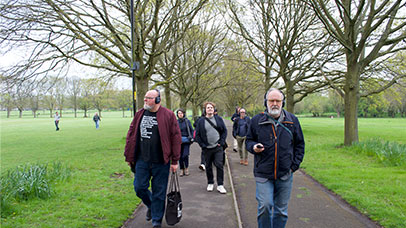 Hosted at College Court on 27 and 28 April 2023, gathered sound studies scholars, museum curators, sound artists and designers coming from different areas of sound expertise to reflect on the emerging need of sonic literacy across the cultural sector.
Hosted at College Court on 27 and 28 April 2023, gathered sound studies scholars, museum curators, sound artists and designers coming from different areas of sound expertise to reflect on the emerging need of sonic literacy across the cultural sector.
Applying a design thinking approach, participants reflected on the relationship between sound, people, and technology, and on the importance to develop more inclusive and diverse sonic practices which can respond to different contexts, spaces and ways of hearing. The two-day workshop made the first steps for a research project aimed at improving the public awareness of the importance of sound and listening, explore the sonic possibilities of technology, and leverage the sound expertise of museums, sound archives, experimental theatre and audio-tech companies.
The workshop was designed with an interdisciplinary and international scope, with delegates from the University of Leicester, Science Museum Group, ARUP, Aural Diversity Network, University of Nottingham, Sonic College in Denmark, NOVA University Lisbon, the Museum of Portable Sound and the Italian company La Piccionaia, which concluded the workshop with an immersive sound walk. This experimental sonic practice enabled the participants to expand their reflection on sound and listening by engaging their body, feelings and sensorial perception, revealing the potential of performative and embodied approaches to sound design.
Guest lecture from Professor James Hendler
Professor James Hendler visited the Institute for Digital Culture on 10 February 2023.
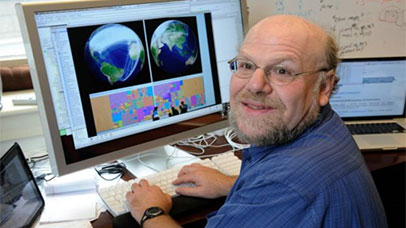
James is a world-renowned researcher in artificial intelligence and distributed computing, with a particular focus on the Semantic Web, linked data, and applications of AI and Web technologies. He is the Tetherless World Professor of Computer, Web, and Cognitive Sciences at Rensselaer Polytechnic Institute, and a Director of both the Rensselaer AI & Reasoning Lab and the Web Science Research Centre.
James gave a lecture entitled Exploring the Boundaries of Artificial Intelligence: A Look at the Present and Future of AI, for which the following abstract was written by GPT3: “This talk will discuss modern Artificial Intelligence (AI) and its impact on society. We will explore current AI technologies and their applications, such as natural language processing, machine learning, and robotics. We will discuss the potential ethical implications of AI, as well as the potential for AI to revolutionize the way we work and live. Finally, we will speculate on the future of AI and the potential implications for our society”.
James covered how systems such as Dall-E (image creation) and ChatGPT work, exploring their limitations and potential. He also chaired a round table discussion on Semantic Web and Digital Humanities which critically examined the technology that is now ubiquitous in the field.
Virtual Set Building: 3D skills for creating virtual environments
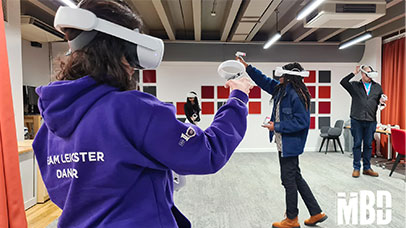 As part of the REAL Inspiration Programme with Phoenix Cinema and Arts Centre (supported by the European Regional Development Fund, Midlands Engine and Arts Council England), Creative Partner MBD introduced local students and young creatives to 3D design tools and virtual set creation. The sessions took place on the 27 January and 3, 10, 17 February 2023.
As part of the REAL Inspiration Programme with Phoenix Cinema and Arts Centre (supported by the European Regional Development Fund, Midlands Engine and Arts Council England), Creative Partner MBD introduced local students and young creatives to 3D design tools and virtual set creation. The sessions took place on the 27 January and 3, 10, 17 February 2023.
With 25 years of experience in immersive storytelling, MBD took a cohort of eight participants through digital storytelling and world building skills, as well as demonstrated how 3D technology can be used to create virtual sets for film or digital artwork.
From screen based interactive work (games), Virtual Reality (VR) or in film and TV (through Virtual Production), participants took part in four weekly sessions at the Digital Culture Studio, Phoenix and MBD’s city centre studio to get hands on with using VR equipment, the Unreal 5 game engine, live cameras and green screen technology.
Aural Diversity Workshop
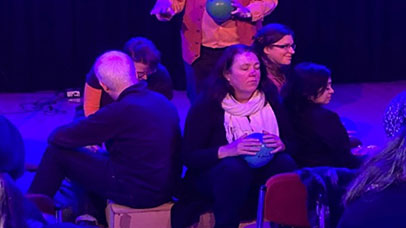 How does hearing difference affect digital culture?
How does hearing difference affect digital culture?
The Arts and Humanities Research Council funded Aural Diversity network explored this and related topics during a two-day workshop that took place on 21 January and 22 January 2023 at the College Court Conference Centre and the Attenborough Arts Centre.
Aural Diversity arises from the simple observation that everybody hears differently. The Aural Diversity project, led by Professor Andrew Hugill, has been researching the consequences of these hearing differences across a range of disciplines. See the Aural Diversity official project page for more information.
The workshop comprised contributions from many aurally divergent academics and artists. Day one included: vibrotactile experiences; EEG (brainwave) performances; video installations; musical works by blind and neurodivergent artists and much more. Day two was a conference session, with papers covering topics such as: bone conduction localisation; spatial perception; multimodal performance for aurally diverse audiences; audiology for musicians; cochlear implants and accessibility.
The Hidden Constellation (podcast, 2022)
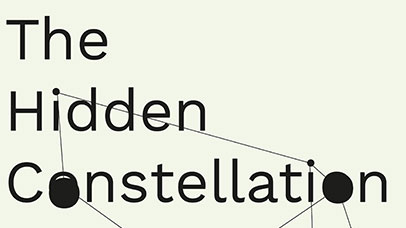 The Hidden Constellation is a podcast series exploring the future of work in museums, presenting a leading STEM museum service thinking about the value and impact of technology in the work that it does, and the work that it will do. Through spending time with volunteers, staff and trustees at Science Museum Group (UK), this podcast presents an alternative constellation of museum work – a map of digital labour that is disrupting traditional hierarchies of museum expertise and heralding radical forms of science participation. Tracing a year-long ethnographic study of the Science Museum Group that explored the everyday digital practices and behaviours that occur across the organisation and its workforce, The Hidden Constellation presents the new, hidden, distributed, legacy, and collective forms of digital labour that can be found in contemporary museums.
The Hidden Constellation is a podcast series exploring the future of work in museums, presenting a leading STEM museum service thinking about the value and impact of technology in the work that it does, and the work that it will do. Through spending time with volunteers, staff and trustees at Science Museum Group (UK), this podcast presents an alternative constellation of museum work – a map of digital labour that is disrupting traditional hierarchies of museum expertise and heralding radical forms of science participation. Tracing a year-long ethnographic study of the Science Museum Group that explored the everyday digital practices and behaviours that occur across the organisation and its workforce, The Hidden Constellation presents the new, hidden, distributed, legacy, and collective forms of digital labour that can be found in contemporary museums.
This podcast was written and presented by Dr Sophie Frost, Honorary Research Fellow at the Institute for Digital Culture, with sound design and product by Chris Thorpe-Tracey (Lo-Fi Arts) and artwork by Matt C. Stokes. It is a research output of One by One UK-US, an Arts and Humanities Research Council funded, multi-partner international initiative that brought together cultural organisations, policy makers, academics, professional bodies, support agencies, and communities of practice, to build digitally confident museums. One by One helped museums of any size better define, improve, measure, and embed the digital literacy of their staff and volunteers in all roles and at all levels.
The Sensational Museum at Mosaic Convening
At the beginning of October 2024, Institute for Digital Culture (IDC) postdoc, Sophie Vohra, travelled to Boise Idaho to learn from and present at the first Mosaic Convening, hosted by Prime Access Consulting (PAC). The following blog details Sophie's experience:
24 hours there, 25 hours back, playing out my own version of Planes, Trains and Automobiles – the cost of an adventure to be part a convening of incredible heritage and access professionals working in the North America and Canada.
On behalf of The Institute for Digital Culture and The Sensational Museum, I was invited to share our research with a number of organisations who work with PAC – an access consultancy company that supports the organisations to create welcoming and equitable spaces for the widest possible audience. As the only British accent in the room, I felt both privileged and slightly fearful to be invited into a space to share and reflect on the American and Canadian experience of designing and implementing access.
While I hope my contribution to the convening discussions was useful, interesting and valid, what I gained from this experience surpassed my already high expectations. From digital to analogue, from small interventions to whole site redevelopments, organisations shared how their work pushed to expand access to cultural heritage. These presentations provided ideas and questions I could take back to the IDC and TSM, such as PAC’s tactile storytelling panels, or the ways we support students’ expectations of working in the heritage industry while developing in-practice sector-specific skill sets.
It was also fantastic to have a series of discussions facilitated by (undeniably brilliant) emerging professionals, that aimed to support their own professional and research-based work. These provocations included how we can create useful, engaging and accessible ‘touch’ interactions, and how accessibility can be cultivated and operationalised for staff across all museum departments.
Importantly, this was not only a space to learn and share, it was an example of how events can be hosted to provide access, equity and comfort for everyone there. The design of the convening felt familiar, as it implemented many accessible features and formats used by TSM for our events and workshops. Fidget tools, lots of snacks and drinks, long breaks, descriptive wayfinding, braille labels, ASL interpreters and CART recordings (also known as real-time captioning) were only some of the ways they ensured comfort and safety. Most impressive (and a fan favourite) was their simple yet effective ‘Sensory Room’, the design of which I most certainly plan to implement in our future events and workshops.
Not only were we treated to fulfilling discussions about our work, we were also treated to a night at the museum, hosted by Boise Art Museum (BAM). Alongside good food, drink and company, we enjoyed access to their exhibitions, including El Sueño Americano (photographic storytelling of the invisible experience of Mexico-United States border crossing for asylum seekers) and Coyote Now (participatory installations and public artworks for people to consider their relationships to the environment, technology, society and culture). There is now a TSM ‘Easter Egg’ on the colouring-in wall, if you make it to BAM.

We finished the event with a fantastic send off at Water Bear, a women and queer owned cocktail lounge. With beautiful closing speeches by PAC’s Corey Timpson and Sina Bahram, an Impact Award was presented to Chris Xu from Slack for the session that most impacted everyone at the convening, and a Community Champion award to Melanie Fales for their work on inclusive design and accessibility at BAM. A fantastic end to an incredible three days. Providing an audio description of an egg-shaped glass for my coconut-milky drink for another attendee was a personal highlight of the night.
I think we were all sad to end the convening, as it was an event that brought together likeminded people, who were excited rather than scared at the prospect of expanding access in their own work. I am very honoured to have been invited to this convening, and I flew away with my mind full of ideas, my soul enriched by renewed empowerment, and my contact list burgeoning with new, incredible people based across the Atlantic Ocean.
I hope that this is the first of many of these convenings, and that, in future, there is a place at the table for more British and European allies to join in these incredible conversations.
Sophie's blog post can also be found on The Sensational Museums website, with accompanying photographs.